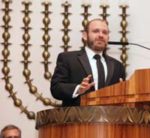By Rabbi Joshua Dorsch

SAN DIEGO — With the Exodus from Egypt behind us, in Parashat Mishpatim, the text of the Torah takes a turn from narrative, to law. This Shabbat we will read about 53 of the Torah’s 613 Mitzvoth. Many of them like the laws about the treatment of servants and foreigners, damages and loans, and the courts, have to do with the way people interact with one another. Next week’s Torah portion mostly consists of specific instructions about the Mishkan, and building the tabernacle.
Reflecting on this juxtaposition of the two Torah portions, Rashi tells us that it is no coincidence that the Sanhedrin, the ancient Israelite court, was located directly across from the the Temple in Jerusalem. And Rabbi Brad Artson takes this one step further. In Bedside Torah, he wrote:
“Rather than two separate realms that have nothing to do with one another, this confluence of verses [about civil law and the building of the tabernacle] remind us that religion has everything to do with justice, compassion, and decency, and that how we behave should reflect our spiritual convictions.”
And I think he is right. There are numerous examples I could cite when following Jewish laws and practices create tension and conflict between community members, family, and friends. Or when people try to justify hurtful, painful, and somewhat disgusting behaviors as an observance of or adherence to Jewish law. But as Artson suggests, when that happens, they are completely missing the point.
Many of us have different relationships with Jewish law. But however it is that we interact with the many Jewish laws, rituals, and traditions, it is my hope and prayer for all of us that when we do, it helps us act more justly, more compassionately, and more decent, towards one another and the world around us.
*
Rabbi Dorsch is spiritual leader of Tifereth Israel Synagogue in San Diego. He may be contacted via joshua.dorsch@sdjewishworld.com